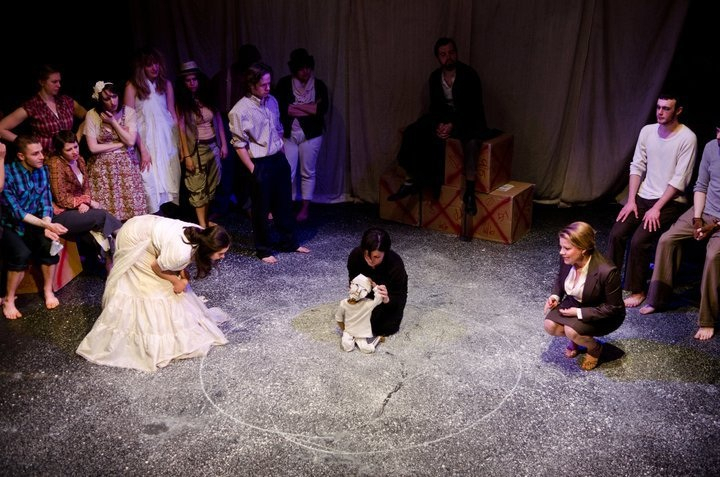Brecht Adaptation Successfully Unearths New Orleans of Old
By Jason Rost
Rating: ★★★
There was a unique and fascinating collaboration that occurred between two small theatre companies this year. The “Full Circle Festival” may have unfortunately fallen off the radar for many theatergoers; however, it began with Theatre Mir’s powerfully resonant production of Bertolt Brecht’s The Caucasian Chalk Circle. Now,
Tim Speicher’s intelligent and creative direction creates a captivating visual and aural experience that is heavy on theatrics and light on political Brechtian alienation. After experiencing Theatre Mir’s substantial production, this abridged retelling is a fresh and exciting compliment.
Before the play begins, the multi-talented Nick Demeris warms up the crowd as a street performer, similar to those that frequented the tourist areas of pre-Katrina New Orleans. We are then catapulted into a pre-hurricane New Orleans by our narrator, Josh Hambrock. He introduces us to Grusha (Ellenkate Finley) on her 21st birthday, which is being celebrated at a downtown nightclub on the eve of an encroaching hurricane. As opposed to Brecht’s Grusha, who is the servant to a governor, Marcantel perfectly casts her as the servant to the mayor of New Orleans’ wife, Nathalie (a strong performance by Jodi Kingsley). Playing her opposite is Simon (Caleb Probst), who proposes marriage on that evening. After her night out, Grusha returns to the boarded up mansion where she resumes her duties as the surrogate mother to the infant son, Michael, of the neglectful mayor’s wife.
And then there’s the storm. Speicher and music director Chris Gingrich create an ingenious cacophony of sound, utilizing the evocative Sound Chorus. Combining crashing sheets of metal, jugs of water, wind vocalizations and drumming, the sense of calamity is created magnificently. During the post-storm, Grusha, along with Nathalie’s forgotten baby, flee for the suburbs of the North Shore seeking refuge with her sister. Instead, she finds what is essentially a Voodoo commune living in the ruins. They have rendered rebuilding pointless and have embraced the ways of “the old.” Their leader is the morally ambiguous Baron Samedi (played by Mark Viafranco with remarkable physicality and dexterity). Her sister does finally appear, now reborn into this ancient religion as Erzulie (Cara Olansky). Olansky is compelling in her performance as a woman who has lost everything and has turned, as often people do after traumatic events, to religion. However, Olansky gives us glimpses of loss and grief behind the stone face of a religion that celebrates the eternal, rather than mourns death.
Although engaged to Simon, Grusha agrees to be wed for security reasons to Zeke (Zachary Kropp), a man who appears to have been crippled from a roof collapse. Kropp gives a somewhat unconvincing performance, and the true motives of the character remains vague. However, for utilitarian purposes, the character serves the plot well during Simon’s discovery of Grusha living a life he had not expected to find her in. The final chalk circle scene remains faithful to Brecht’s original text, yet is modified just enough to allow for the ending to carry a certain element of surprise.
While there is strong acting and talent throughout, the casting could benefit from more diversity in ethnicity and age to truly provide the authenticity of New Orleans. Overall, the cast plays slightly on the younger side for a play focused on old traditions. Nevertheless, formidable performances are given by Finley and Probst. Hambrock is engaging as part Our Town Stage Manager: floating in and out of the world of the play, omnipresent, setting scenes and introducing characters—and part Orson Welles in The Third Man: revealing his true function as the judge of morality only in the final act, playing Brecht’s “walking contradiction,” Azdak.
Marcantel’s script is entirely worthy of this fine production. She has found an appropriate contemporary setting for this story and carries the action briskly with high stakes. She perhaps misses an opportunity to connect to Brecht’s original play further due to the fact that she treats the hurricane solely as a natural disaster without examining the political catastrophe in the city more in depth. Whereas Brecht’s war of rebellion was more concerned with the manmade cycle of oppression and corruption, the hurricane in Marcantel’s adaptation is rather “Oz-ian”, a dramatic tool in the form of a catastrophe turning the world upside down. I was also left wondering why Marcantel goes to great authentic lengths in setting this story richly in New Orleans, yet never quite goes as far as referencing New Orleans, Katrina or any other specifics directly. It’s possible some immediacy was lost with this decision. Her dialogue is best in the earlier sections of the story discussing class struggles and Voodoo practices, but falls slightly flat in the oversentimentality of the Grusha and Simon love story.
 In the end, it is Speicher’s concept, the emergence of the past from the ruins of modernity, which makes this play a must-see. He truly understands the ritualistic nature of Marcantel’s setting. Gingrich and Riggs’ music is a driving force of nature throughout the play. The Sound Chorus serves as the spiritual voice and heartbeat of old traditions made anew. Shaun Renfro’s set design condenses the action to an intimate section of the barn-like Viaduct space by the use of hundreds of cardboard boxes, reminiscent of essentials that were airdropped to Katrina survivors. In addition, Renfro creates an ingenious playground of set pieces that allow for interaction with the actors. Taylor Bibat’s shadow puppetry represents the concept perfectly by providing an ancient theatrical tradition as opposed to video projections.
In the end, it is Speicher’s concept, the emergence of the past from the ruins of modernity, which makes this play a must-see. He truly understands the ritualistic nature of Marcantel’s setting. Gingrich and Riggs’ music is a driving force of nature throughout the play. The Sound Chorus serves as the spiritual voice and heartbeat of old traditions made anew. Shaun Renfro’s set design condenses the action to an intimate section of the barn-like Viaduct space by the use of hundreds of cardboard boxes, reminiscent of essentials that were airdropped to Katrina survivors. In addition, Renfro creates an ingenious playground of set pieces that allow for interaction with the actors. Taylor Bibat’s shadow puppetry represents the concept perfectly by providing an ancient theatrical tradition as opposed to video projections.
The final monologue Marcantel writes for Azdak is poetic and resonant stating, “It’s hard to see how everything comes together, until everything falls apart.” While this production soars, I am left hoping that Marcantel may continue to develop the script into a full adaptation finding more parallels and urgency in the injustice that occurs in the aftermath of natural disasters. It is of high compliment that I wished to spend even more time with these characters and in this world Marcantel has transplanted them to—nevertheless, it is immediately an important piece of theatre this season that should not be overlooked.







